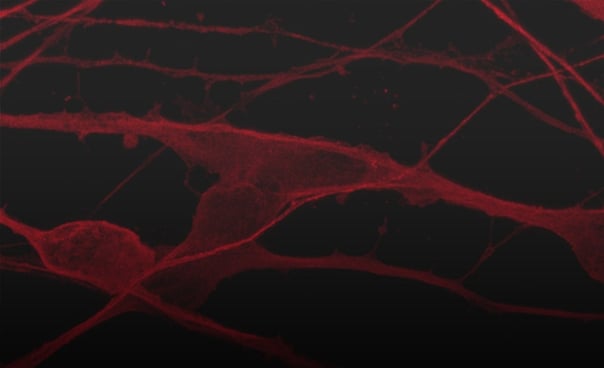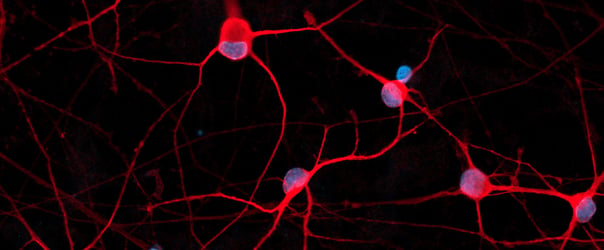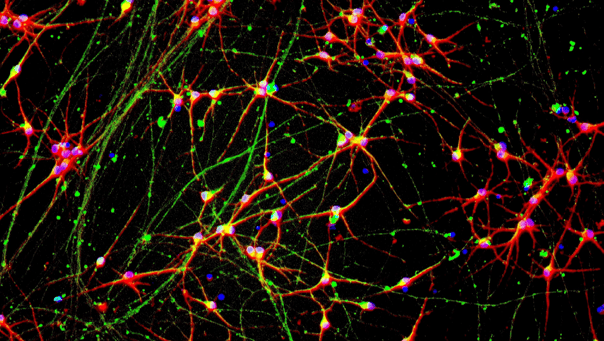Human iPSC-derived neurons
Nerve cells, also known as neurons are the fundamental units of the brain and nervous system, responsible for receiving and transmitting information throughout the body. Rich with multiple neuronal cell types and varied glial cells, neural tissue has historically been difficult to model in vitro [1]. Such modelling challenges greatly slow our progress in understanding and treating neurodegenerative disease. Fortunately, this is changing with recent advances in induced pluripotent stem cell (iPSC) technology.
bit.bio’s deterministic cell programming technology (known as opti-ox™) enables the rapid conversion of entire cultures of stem cells into a precise cell identity with unprecedented consistency. The rapid gain of functionality of bit.bio’s human nerve cells empower researchers to build the types of physiologically relevant in vitro models needed to drive research into neurodegenerative disease and neuropsychiatric disorders, and the data-backed lot-to-lot consistency enables standardisation across assays used in early stages of drug discovery, from target identification to clinical translation.
Elevate your research with bit.bio’s human iPSC-derived neurons, from CRISPR-Ready glutamatergic neurons to ALS-specific motor neurons.
Engineered to meet your workflow with our toolkit of ioDisease Model Cells and CRISPR-Ready ioCells
Producing 3D Neuronal Microtissues for Preclinical Drug Screening using ioGlutamatergic Neurons
Dive into this application note, to discover how ioGlutamatergic Neurons and iPSC-derived astrocytes have been used in 3D microtissues, to build a powerful model system for medium- to high-throughput drug screening and more productive preclinical drug development.

Product resources
DOC-3073 V2
2025
bit.bio
Dr Deepak Srivastava | King’s College London
Mark Kotter | CEO and founder | bit.bio
Marius Wernig | Professor Departments of Pathology and Chemical and Systems Biology | Stanford University
Dr Ania Wilczynska | Head of Computational Genomics | Non-Clinical | bit.bio
Prof Roger Pedersen | Adjunct Professor and Senior Research Scientist at Stanford University
Dr Thomas Moreau | Director of Cell Biology Research | bit.bio
Emmanouil Metzakopian | Vice President, Research and Development | bit.bio
Javier Conde-Vancells | Director Product Management | bit.bio
Tom Brown | Senior Product Manager | bit.bio
Marcos Herrera Vaquero, PhD | Senior Scientist | bit.bioInês Ferreira | Senior Product Manager | bit.bio
Ben Bar-Sadeh, PhD | Senior Scientist | Anima Biotech
Tom Brown | Senior Product Manager | bit.bio
References
1. Pereira I, Lopez-Martinez MJ, Samitier J. (2023) Advances in current in vitro models on neurodegenerative diseases. Front. Bioeng. Biotechnol. doi: 10.3389/fbioe.2023.1260397.
























Hoescht(blue)_day12v2.png?width=604&name=bit.bio_ioGlutamatergic%20Neurons_20xMAP2(red)Hoescht(blue)_day12v2.png)
Hoescht(blue)TUBB3(blue)_day4.jpg?width=604&name=bit.bio_ioGlutamatergic%20Neurons_60xMAP2(red)Hoescht(blue)TUBB3(blue)_day4.jpg)


.png?width=604&name=ioMotor%20Neuron%20Hero%20image%20for%20Webinar%20(1).png)
